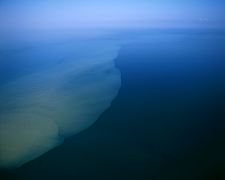 Eco-Innovation in Water and Wood
Eco-Innovation in Water and Wood
Internationalization was the recurring recommendation emanating from the 13th European Forum on Eco-innovation that took place in Lisbon on 26-27 November 2012. Particularly in times of economic crisis, Europe needs to look beyond its borders to “develop new markets for eco-innovation” as the title of the forum implied – in this case with a special focus on the water sector.
Scientists and specialists have been warning about the looming water crisis for decades. This map of global water stress shows increasingly dark areas for where water scarcity is most prevalent, particularly in the Mediterranean region where over 60 million people already live in conditions of water scarcity.
European Commissioner for the Environment, Janez Potočnik warned that by 2030 there will be a 40% reduction of water resources due to the incremental demand of human consumption. He stressed the need to “mobilize the sustainable energy and innovation value chain” and inferred that the approval of the European water blueprint in the fall of 2012 is a step in that direction.
Timo Makela, Director of International Affairs, LIFE and Eco-innovation unit within the Directorate-General for the Environment provided more details about the 2020 strategy of the European Commission that includes increased regulations, more demonstration projects, higher standards, as well as financing and support mechanisms for small and medium enterprises (SMEs).
Executive Vice President of the Swedish Environmental Research Institute, Östen Ekengren, encouraged the need to export SME products and technologies. European Member States still act too nationally, particularly when dealing with China. Ekengren referred to the European Business Technology Center (EBTC) in India as exemplary in facilitating access for European companies.
“Avoid fencing” and “build bridges” was the message sent by President of the Portuguese Water Partnership, Francisco Nunes Correia, who asserted that “innovation is not necessarily about hyper-technology”. For Correia, innovation is about “new ideas” and is “socially-driven”, and in accordance with Ekengren’s views, innovation in Europe needs be more global in its outlook.
Making Investments
There is no lack of funds being injected into research and development, new projects and businesses, but it still does not seem enough for a stagnating European economy and a general recession across the Continent. There is really a need for more movement and more vibrant concepts and ideas to circulate and inspire businesses to invest more to make the market pick up again.
Within the European Commission’s FP7, Framework Program for Research and Innovation, between 2007-2013, a final call for projects in 2013 was made at the highest amount ever for a total of €8.1 billion, of which €1.2 billion are to be directed towards SMEs considered as vital for innovation and the creation of ‘green’ jobs in Europe.
This will be a stepping stone towards the larger Horizon 2020 framework that will be more cross-sector oriented and geared towards societal challenges such as climate action, resource efficiency, raw materials and natural resources, including water of course. €3.16 billion have been earmarked for these priorities within Horizon 2020.
In the private sector, Georgios Floros from the Commission’s Directorate-General for Economic and Financial Affairs, described how venture capital has been injected in eco-innovation. €376 million were invested in venture funds such as the Capricorn Cleantech Fund, Demeters Partners and others, with a cumulative impact of 6.6% on the entire EU market.
Antonio Santos, Portugal’s adviser to the State Secretary for the Ministry of Entrepreneurship, said this all indicated a “new wave of innovation” and enumerated the priorities for Portugal to focus on increasing skills, connecting science and technology, encouraging SMEs, and creating frameworks for greater venture capital to be invested in innovative initiatives.
Exporting Paper
On August 21, 2009, at 16:28, the first piece of paper was produced by the giant Portucel Soporcel Group paper mill which would quickly become the world’s largest paper-maker of 500 tons of paper per year. 80 trucks leave the Setubal mill south of Lisbon every day, consisting of paper orders from 120 countries. 95% of the paper produced is exported, comprising 3% of all of Portugal’s exports.
Besides the rotating roundtables of 30 minutes per table during the 13th Eco-Innovation Forum in Lisbon, the most original aspect of this event was the visit to this massive paper mill, one of three around Portugal, to learn about the paper-making process, the products and trees used, and the growing corporate social responsibility of the Portucel Soporcel Group.
There is a certain amount of controversy about importing eucalyptus trees from Australia to grow in Portugal: eucalyptus grows fast and can be cut after five years, which creates a greater turnover but also affects local ecosystems; eucalyptus however has better fiber and allows for more recycling, you can get lighter paper for better quality now – something Revolve Magazine will consider for 2013.
| Contact information | n/a |
|---|---|
| News type | Inbrief |
| File link |
http://www.revolve-magazine.com/home/2012/12/03/eco-innovation-in-water-and-wood/ |
| Source of information | REVOLVE |
| Keyword(s) | water crisis, water blueprint |
| Subject(s) | ENERGY , FINANCE-ECONOMY , HYDRAULICS - HYDROLOGY , INFORMATION - COMPUTER SCIENCES , METHTODOLOGY - STATISTICS - DECISION AID , NATURAL MEDIUM , POLICY-WATER POLICY AND WATER MANAGEMENT , RISKS AND CLIMATOLOGY , WATER DEMAND , WATER QUALITY |
| Relation | http://www.revolve-magazine.com/home/wp-content/uploads/2012/12/Global_Water_Stress.jpg |
| Geographical coverage | n/a |
| News date | 19/12/2012 |
| Working language(s) | ENGLISH |
 you are not logged in
you are not logged in





